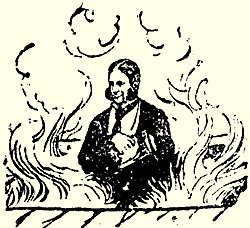 |
 |
||||||
The Pall Mall Gazette (London, England), Tuesday, October 14, 1884; Issue 6114.
"THE SORCERER" AT THE SAVOY
After a run of nearly a year, "Princess Ida" has been withdrawn, and on Saturday night a large audience filled the Savoy Theatre to witness the revival of Mr. Gilbert's and Sir Arthur Sullivan's opera "The Sorcerer" which was first produced at the Opera Comique in 1877. In none of their operas have the author and composer worked together with more sympathy. The book is humorous, the dialogue full of Gilbertian pungency, and every number of the music is melodious and tuneful. The libretto, indeed, is said to have underfgone revision, but the emendations appear to be few, and even without them it would not have suffered much. "But I am a member of the Army and Navy Stores," says Alexis when he is bargaining for the love-philtre with Mr. Wells; "Ah! Then we allow you 25 per cent discount." On Saturday the audience laughed and applauded as heartily as ever, and, if one may judge by the enthusiasm of a first night, it may be safely predicted that the revival is certain of a lengthy run.
 |
| The Sorcerer |
The opera, it is scarcely necessary to say, derives its name from a commercial "sorcerer" – one Mr. Wells, of the firm of J. W. Wells and Co., the old-established family sorcerers in St. Mary Axe – who practises necromancy in all its branches. It is his wonderful love-philtre which does all the mischief. Alexis has curious theories respecting matrimony, which he confides to Aline as they are preparing for their own nuptials. "Would," he cries, "that the artificial barriers of rank could be broken down, of wealth, education, age, beauty, habits, taste, and temper, and the principle recognized that in marriage alone is to be found the panacea for every ill." To further this crotchet he buys the philtre from the insidious Wells, and it is administered in a teapot to the assembled company, with terrible results. Old men fall in love with young women, and young men with old women. Too late Alexis discovers the evil he has wrought by his interference. Mr. Wells comes to the rescue by consenting to die – the only way out of the difficulty – and disappears below amid flames, the last we see of him being his hat and a shower of business cards.
Of those who played in the original cast only three remain, Mr. Grossmith, Mr. Rutland Barrington, and Mr. Richard Temple. Mr. Grossmith scored a great success in his old part of the Sorcerer, Mr. John Wellington Wells: attired in frock coat, brown trousers, with a resplendent hat, a brown tie lying on an expanse of shirt front, a white waistcoat, and lemon kid gloves, he cuts an indescribably funny figure. His delivery of the patter songs is inimitable, while the incantation and the dance round the teapot are rendered with wonderful cleverness and effect. Mr. Barrington sustains the grave and dignified air of the Vicar with much humour; Mr. Lely scored a great success as Alexis, and Mr. Temple as Sir Marmaduke was all that could be asked for. Miss Braham as Aline sings very charmingly and acts with much spirit and vivacity; Miss Brandram as Lady Sangazure, and Miss Jessie Bond as the lovelorn maiden Constance, are very successful. Miss Ada Dorée was fairly satisfactory as the pew-opener.
The music is so familiar that there is no need to recapitulate the numbers, which have long ago established themselves as popular favourites. It is enough to say that encores were very numerous.
A word may be said for the peasant girls, who, in their pretty muslin frocks, high-waisted, bound round with broad ribbons, with dainty bonnets of different colours, make as bright and attractive a series of pictures as could be imagined.
 |
| Mr. Grossmith goes down below |
"The Sorcerer" was followed by "Trial by Jury." It was late – eleven o'clock – when the curtain went up, and the pittites amused themselves during the interval by singing, "We won't go home till morning." It was Mr. Fred Sullivan who made the part of the Judge famous in days gone by, so famous that when he died in New York it was said that he had gone to Heaven to meet the only Judge who could surpass him. This mot will never be applied to Mr. Barrington, who now plays the Judge very indifferently. Miss Florence Dysart was not very successful in her début as the Plaintiff. Mr. Lely was a fairly good Defendant, and the choruses had evidently been carefully drilled.
Page modified 13 April 2012